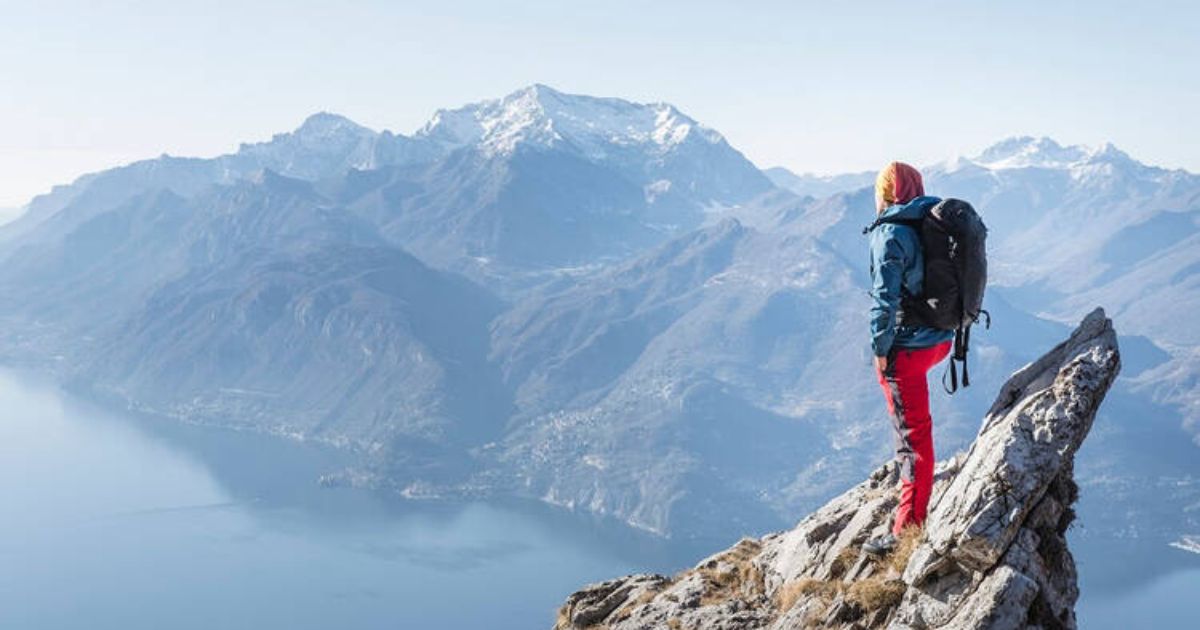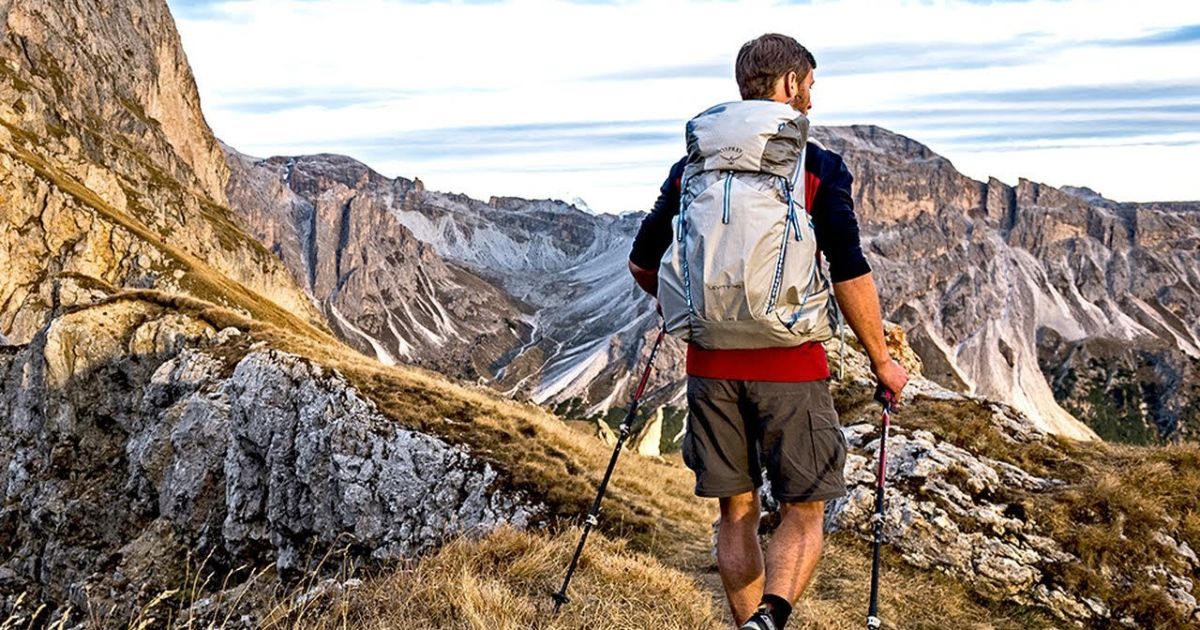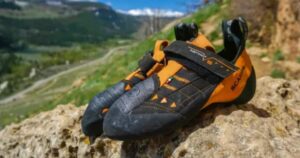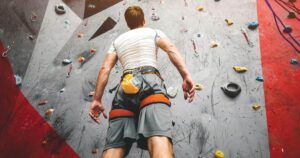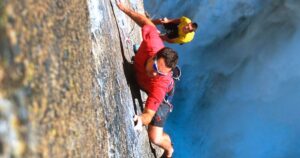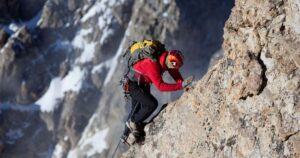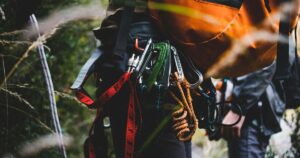Imagine a rock climber ascending a towering peak, their determination and strength propelling them upwards. But what if I told you that there’s more to their success than just their physical prowess? Enter the 7.5 kg backpack, an essential tool that enhances a climber’s performance and endurance. In this article, we will explore the impact of carrying such a load, the necessity of food and water, and the strategies for packing a backpack to achieve optimal stability. Get ready to discover the secrets behind a rock climber’s essential companion.
Key Takeaways
- Carrying a 7.5 kg backpack enhances strength, performance, and endurance in rock climbing.
- Proper weight distribution and strategic packing techniques are crucial for balance and stability.
- Food and water are necessary for sustenance during climbs while maintaining a manageable load.
- Choosing the right backpack weight based on fitness level, climb difficulty, length, and weather conditions is important.
Importance of Carrying Essential Gear
The inclusion of essential gear is of utmost importance for rock climbers at the Rock Climbing Gym, ensuring their safety and preparedness during challenging climbs. Carrying the right equipment not only enhances a climber’s performance but also minimizes the risk of accidents or injuries. A well-equipped climber understands the significance of items such as a helmet, harness, and ropes, which provide protection against falls and head injuries.
Additionally, carrying climbing shoes with proper grip and support improves traction and stability while scaling steep rock faces. Other essential gear includes carabiners, quickdraws, and belay devices, which play a crucial role in securing climbers and facilitating smooth rope management. By equipping themselves with the necessary gear, climbers can navigate difficult terrains with confidence, knowing that they are well-prepared for any challenges that may arise. This focus on safety and preparedness sets the stage for enhancing climbers’ performance and endurance in their quest to conquer new heights.
Enhancing Climber’s Performance and Endurance
To optimize a rock climber’s performance and endurance, carrying a 7.5 kg backpack can provide a valuable challenge and opportunity for strength and stamina building. By adding this extra weight while climbing, climbers can improve their stamina and increase their overall endurance levels. The backpack acts as a resistance training tool, forcing climbers to exert more effort and engage their muscles in a different way.
This not only enhances physical strength but also promotes mental preparation by pushing climbers to overcome challenges and push past their limits. Mental preparation is essential in rock climbing, as it requires focus, determination, and the ability to stay calm under pressure. The table below provides a visual representation of the benefits of carrying a backpack for improving stamina and mental preparation:
| Benefits of Carrying a Backpack | |
|---|---|
| Improves Stamina | Increases Endurance |
| Strengthens Muscles | Enhances Mental Resilience |
| Builds Confidence | Promotes Problem-solving Skills |
The Impact of 7.5 Kg on Climbing Abilities
Adding a 7.5 kg backpack to a rock climber’s load significantly affects their climbing abilities. The additional weight can impact their performance, as it increases the physical demands and challenges their strength and endurance. Climbers must also consider the safety considerations and risks associated with carrying extra weight, as it can affect their balance, stability, and overall ability to navigate the climbing route effectively.
Performance With Added Weight
When wearing a 7.5 kg backpack, rock climbers experience a noticeable impact on their climbing abilities. The added weight affects their overall performance, making each movement more challenging and requiring increased effort. However, climbers can use this added weight to their advantage by implementing specific training techniques that enhance their performance. Here are two sub-lists highlighting these techniques:
- Strength Training
- Incorporate weighted exercises such as squats, lunges, and deadlifts to build lower body strength.
- Include upper body exercises like pull-ups, push-ups, and overhead presses to develop upper body strength and stability.
- Endurance Training
- Perform climbing-specific exercises such as traversing, bouldering, and climbing with the weighted backpack to improve endurance.
- Increase the duration and intensity of climbing sessions gradually to build stamina and adapt to the added weight.
Safety Considerations and Risks
The additional weight of a 7.5 kg backpack significantly impacts a rock climber’s abilities, necessitating careful consideration of safety and potential risks. When climbing with added weight, safety precautions become even more critical to prevent injuries and accidents. The increased load can affect a climber’s balance and stability, making it more challenging to maintain control and maneuver on the rock face. It places additional strain on the climber’s muscles and joints, increasing the risk of fatigue and potential overexertion.
Proper training and conditioning are essential to build the strength and endurance necessary for managing the added weight. Additionally, climbers must be mindful of potential hazards and adjust their technique accordingly to minimize the risk of falls or other accidents. As we explore the necessity of food and water in the backpack, it is essential to balance the weight with safety considerations and injury prevention.
Necessity of Food and Water in Backpack
To sustain the physical demands of rock climbing, a climber must prioritize hydration and nutrition. Carrying food and water in their backpack becomes a crucial necessity for their survival. However, the weight of these provisions can present a challenge, as a heavier backpack can hinder a climber’s mobility and endurance. Striking a balance between carrying enough supplies for sustenance and maintaining a manageable load is essential for rock climbers to ensure their safety and well-being during their ascent.
Essential Hydration and Nutrition
An adequate supply of food and water is essential for a rock climber wearing a 7.5 kg backpack. Hydration strategies play a crucial role in the performance and safety of climbers. Proper hydration helps maintain body temperature, lubricate joints, and transport nutrients to muscles. It is recommended for climbers to drink water before, during, and after climbing to prevent dehydration.
Additionally, nutrition for climbers is vital to sustain energy levels and aid in muscle recovery. A well-balanced diet should include carbohydrates for immediate energy, proteins for muscle repair, and healthy fats for sustained energy. Climbers can also benefit from snacks such as energy bars, nuts, and dried fruits for quick and convenient fuel during climbs. Adequate hydration and nutrition are essential for rock climbers to endure the physical demands of their sport and optimize their performance.
Weight Vs Survival Needs
Properly assessing the weight of a rock climber’s backpack is crucial in determining the necessary provisions for survival, including food and water. Weight management plays a vital role in a climber’s physical endurance and overall success in conquering challenging terrains. Carrying excessive weight can drain a climber’s energy and hinder their ability to navigate treacherous paths.
On the other hand, insufficient supplies can lead to dehydration, and malnutrition, and ultimately, endanger their survival. To strike the right balance, climbers must carefully consider the weight of their food and water provisions. The table below provides a general guideline for the recommended weight of food and water based on the duration of the climb:
| Duration of Climb | Food (per day) | Water (per day) |
|---|---|---|
| 1-3 days | 0.5-1 kg | 2-3 liters |
| 4-7 days | 1-2 kg | 3-4 liters |
| 8+ days | 2-3 kg | 4-5 liters |
Balancing Weight Distribution for Stability
Achieving stability in rock climbing requires careful attention to balancing weight distribution within a 7.5 kg backpack. Proper body alignment and techniques for weight distribution are crucial in maintaining stability and preventing falls.
To achieve proper body alignment, climbers should focus on maintaining a neutral spine, aligning their hips, shoulders, and head in a straight line. This helps distribute weight evenly and reduces strain on the body. Additionally, engaging the core muscles and keeping a slight forward lean can further enhance stability.
Techniques for weight distribution involve strategically placing heavier items closer to the climber’s back, such as water bottles or climbing gear, to maintain a lower center of gravity. This helps in preventing the backpack from pulling the climber off-balance. Distributing weight evenly between the left and right sides of the backpack also promotes stability and prevents strain on a single side of the body.
Strategies for Packing a 7.5 Kg Backpack
To ensure optimal weight distribution and stability, rock climbers frequently employ strategic packing techniques for a 7.5 kg backpack. These packing techniques are crucial for minimizing weight and maximizing efficiency during a climb. One strategy is to pack the heaviest items close to the back, distributing the weight evenly and reducing strain on the body. This helps maintain balance and stability while navigating challenging terrains.
Additionally, climbers often choose lightweight gear and prioritize essential items to minimize the overall weight of the backpack. They carefully consider the necessity and functionality of each item, eliminating any unnecessary or redundant items. By employing these packing techniques, climbers can reduce the overall weight of their backpacks, ensuring they have the necessary equipment while maintaining agility and endurance during their ascent.
Evaluating the Benefits of a 7.5 Kg Load
The advantages of carrying a 7.5 kg load for a rock climber are multifaceted, encompassing improved maneuverability, reduced fatigue, and enhanced endurance. When a climber opts for lightweight gear, they enjoy a range of benefits that positively impact their performance on the rock face. These benefits include:
- Improved Maneuverability: The reduced weight allows climbers to move more freely, making it easier for them to navigate challenging routes and execute complex movements with precision.
- Reduced Fatigue: Carrying a lighter load significantly decreases the strain on the climber’s body, resulting in reduced muscle fatigue and improved overall energy levels throughout the climb.
- Reduced muscle fatigue enables climbers to maintain their strength and agility for longer periods, enhancing their climbing performance.
- Enhanced Endurance: By opting for lightweight gear, climbers can conserve energy, enabling them to sustain their climbing efforts over extended periods. This improved endurance allows climbers to tackle longer and more challenging routes, pushing their limits and achieving personal growth.
Considering the long-term effects of carrying heavy loads, investing in lightweight gear offers rock climbers a competitive edge, enabling them to perform at their best while minimizing the risk of injuries and fatigue-related setbacks.
Tips for Choosing the Right Backpack Weight
When selecting the appropriate weight for a backpack, rock climbers should consider several factors to optimize their performance and minimize physical strain. Choosing the right backpack weight is crucial for maintaining balance and stability while climbing. It is important to distribute the weight evenly to prevent strain on specific areas of the body.
A well-distributed backpack weight ensures that the climber can move freely and maintain a proper center of gravity. To help climbers make informed decisions, the following table provides tips for choosing the right backpack weight and distributing it effectively:
| Tips for Choosing Backpack Weight | Backpack Weight Distribution |
|---|---|
| Consider your fitness level | Distribute weight evenly |
| Assess the difficulty of the climb | Place heavy items at the bottom |
| Evaluate the length of the climb | Use compression straps to secure load |
| Determine the weather conditions | Keep frequently used items within easy reach |
| Take into account personal preferences | Adjust straps for a snug fit |
Frequently Asked Questions
How Does Carrying Essential Gear Contribute to a Rock Climber’s Safety and Overall Experience?
Carrying essential gear significantly enhances a rock climber’s safety and overall experience. Proper equipment ensures protection from falls, weather conditions, and other potential hazards. It also provides the climber with the necessary tools to navigate challenging terrains and accomplish their goals.
What Are Some Techniques or Exercises That Climbers Can Use to Enhance Their Performance and Endurance While Carrying a 7.5 Kg Backpack?
To enhance performance and endurance while carrying a 7.5 kg backpack, rock climbers can employ various techniques and exercises. These methods focus on building strength, improving balance, and increasing stamina, ensuring climbers can conquer challenging terrains with ease and efficiency.
How Does the Weight of a 7.5 Kg Backpack Impact a Climber’s Ability to Maneuver and Climb Effectively?
The weight of a 7.5 kg backpack can significantly impact a climber’s ability to maneuver and climb effectively. It can affect their climbing speed, balance, and coordination, making it crucial to consider the added load when planning climbing strategies.
Why Is It Necessary for Climbers to Carry Food and Water in Their Backpacks During Their Climbs?
Climbers must carry food and water in their backpacks to meet their hydration and nutrition needs during climbs. Weight management is crucial in climbing, and the additional weight of food and water ensures they have the sustenance to perform effectively.
What Strategies Can Climbers Use to Ensure Proper Weight Distribution and Stability While Carrying a 7.5 Kg Backpack?
Weight distribution techniques and stability exercises are crucial for climbers carrying a 7.5 kg backpack. Proper weight distribution can be achieved by organizing gear and adjusting straps, while stability can be enhanced through core strengthening and balance training.
Conclusion
In conclusion, carrying a 7.5 kg backpack can have a significant impact on a rock climber’s performance and endurance. While it is necessary to carry essential gear, it is important to balance weight distribution for stability and consider the necessity of food and water. By evaluating the benefits of a 7.5 kg load and using strategic packing techniques, climbers can optimize their abilities. Choosing the right backpack weight is crucial for enhancing climbing abilities and ensuring a successful and safe climbing experience.
